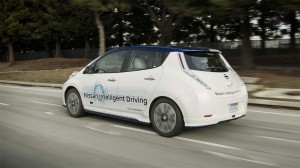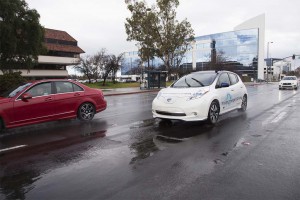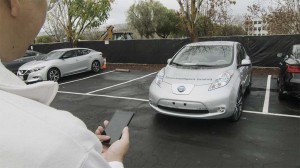
Nissan and Renault won't be the first to market with an autonomous vehicle, but they may have the most vehicles with the technology.
In the race to bring autonomous driving to market, the Renault-Nissan Alliance is hoping to gain a lead – if not by being first then by offering more self-driving cars than the competition.
The Euro-Asian partners plan to launch “more than 10” vehicles equipped with self-driving technology by 2020, adding that the goal is to go mainstream, with affordable, mass-market products.
“Renault-Nissan Alliance is deeply committed to the twin goals of ‘zero emissions and zero fatalities,'” CEO Carlos Ghosn said during a visit to the Renault-Nissan Silicon Valley Research Center. “That’s why we are developing autonomous driving and connectivity for mass-market, mainstream vehicles on three continents.”
Long the stuff of science fiction, automakers are rapidly transforming autonomous technology into a reality. A wide range of current products already offer the precursors of self-driving technology, systems like forward collision warning with auto braking, and Lane Keeping Assist. Tesla recently introduced its semi-autonomous AutoPilot system, capable of hands-free driving on a well-marked, limited-access highway.
(Nissan considering long-range hybrid. For more, Click Here.)
Mercedes-Benz, BMW, Cadillac – and Nissan – all plan to steadily expand the capabilities of their vehicles by decade’s end. But going from semi-autonomous to full hands-free driving is still a significant challenge, and there is widespread debate over just how soon that can happen.
During a presentation at the Consumer Electronics Show in Las Vegas last week, Gill Pratt, the new head of the Toyota Research Institute – charged with developing advanced mobility technology – said he was not ready to predict when the Japanese giant would have its own autonomous system on the road.
Kia officials laid out their timetable at a separate CES event, but they don’t expect to be able to handle full autonomy until 2030.
Nissan was the first automaker to formally announce an autonomous vehicle target – 2020. And CEO Ghosn has repeatedly said the company, along with partner Renault, remains on track. But his announcement in Silicon Valley takes things a big step beyond, revealing plans to outfit a wide range of products, not just a single vehicle.
(Click Here for details on Kia’s plans to phase-in autonomous vehicles.)
Nissan has been using a version of the Leaf battery-electric vehicle as a “mule” for testing autonomous technology. It has hinted that the second-generation Leaf will be the first model out of the blocks.
As with its competitors, Nissan plans to phase in self-driving, starting this year with what it calls “single lane control.” That system, it explains, “allows cars to drive autonomously on highways, including in heavy, stop-and-go traffic.”
Nissan will add more features, including connected-car technology, in 2017 and 2018.
Safety experts believe autonomous driving could yield massive benefits, noting that more than 90% of all highway fatalities result from driver error. Some proponents believe the technology could effectively eliminate highway deaths. Others are more cautious, warning there will always be some crashes.
(To see more about Volvo’s new S90 debuting semi-autonomous technology, Click Here.)
“Zero accidents will never happen,” cautions Amnon Shashua, founder and CEO of Israeli-based Mobileye, which supplies camera-based systems to the auto industry. But he believes such technology could reduce the number of U.S. highway fatalities by “three orders of magnitude,” to perhaps 300 deaths a year, down from more than 30,000 today.



They had better wait until they get the first properly functioning one built before offering “10”. LOL